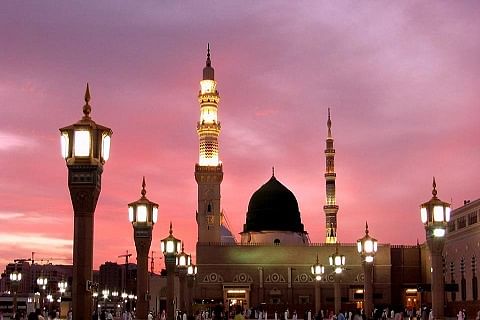The Jews of Banī al-Najjar shall enjoy same rights as enjoyed by the Jews of Banī ‘Awf. Similarly the Jews of other tribes shall enjoy same rights as of Banī al-Najjar.
And the Jews of Banī Tha‘labah shall enjoy the same rights as that of the Jews of Banī ‘Awf except one who commits injustice or crime, he shall ruin none but his own self or his households.
Then many other Jewish tribes and their branches are mentioned and all of them are given same rights as given to Banī ‘Awf.
And no one of them shall go out (for war) without the permission of Muhammad.
Whoever sheds blood its responsibility shall be on his own shoulders and his family except that who has been wronged, Allāh is with him. The Jews shall bear their expenses and the Muslims shall bear their expenses.
Whoever wages war against the holders of this document then they (the Jews and the Muslims) shall help each other. They shall go for mutual welfare and consultation and shall fulfill their promises and keep their words and shall do no wrong.
And nobody shall be deemed responsible for his ally’s wrong deed and after all the oppressed shall be helped.
And for the holders of this document (the Muslims and the Jews) Madīnah shall be sacred (i.e., they shall not create any kind of mischief over there).
And the refugee shall be treated as his host is treated; neither shall he be harmed nor shall he commit any wrong.
And if there arose any new dispute or quarrel between the upholders of this document leading thereby to fasād between them, then they shall submit it before Allāh and His Messenger. Allāh likes that this document be followed with obedience and care.
And the Quraysh shall not be given shelter nor shall he be given shelter who helps them.
And if anyone attacks (Madīnah) they (the Muslims and the Jews) shall help each other.
And if anyone invites them towards making Sulh (reconciliation, peace) and towards taking part in (the process of) Sulh, they shall accept and take part. Similarly when they invite anyone towards Sulh they shall except it (themselves first) and its acceptance shall be obligatory on the Muslims also except when someone fights against Islām.
And this document shall support no Zālim (Oppressor) or wrong doer. And whoever goes out for war (against the enemies) and whoever sits (in home and does not take part in war) both shall enjoy peace and security except those who commit injustice or crime.
And Allāh and His Messenger Muhammad are on the side of that person who fulfills his promise and obeys Allāh and does not harm anybody.
This is the world’s first written constitution.
The contribution and achievements of this constitution can be summarized as under:
It built the Madinān society on the strong foundations of brotherhood.
It put an end to all discriminations of caste, colour, ethnicity, tribal prejudice.
The Muslims were considered one Ummah on the basis of Dīn not on blood relations or birth place. Thus they would all help the poor and would justly give financial assistance to the debtor so that he could justly pay the creditor his due.
The non-Muslims are given full religious freedom including legal and judicial freedom as well.
The polytheists and the Jews were not allowed to give asylum to any Qurayshī. This in turn left no door open for the Jews to spread mischief in Madīnah as had been their old behaviour.
The Muslims and the non-Muslims were considered as the citizens of the same state and both the groups were demanded to abide by their own norms and in case they had any dispute, they had to necessarily submit before Allāh’s Messenger.
War and peace were considered indivisible i.e.; if there was war, it was for all and if there was peace, it was for all.
In case of murder or freeing of slaves (prisoners) paying of diyat (blood money) or fidyah (ransome) was made collective responsibility of each tribe. In this way its fulfillment was ensured as an individual could easily escape in absence of any political power in those days.
By creating the fear of Qisās (an eye for an eye etc) and diyat (in case the guardians or heirs of the deceased accepted that) security was given to life and property, be it of a Muslim or a non-Muslim.
Nobody was allowed to give shelter to any wrong person so that crime in the society could not get any encouragement. In this way the age-old tribal custom of ‘might is right’ was put to end. It meant that justice and security was available to all and there was no consideration of anybody’s tribal status in the matters of justice and equity.
The Jews were given freedom and security but it was not unconditional; they were in return demanded to keep peace and harmony alive, show loyalty and not to spread mischief in society.
The Muslims and the Jews as the citizens of the same state were demanded to live on the principles of mutual love and respect, peace and security, sincerity and reconciliation.
Briefly, this constitution made Madinah a well established state wherein peace dwelt and justice ruled.
It was the first great commonwealth which not only repeated and re-asserted the message of real peace and true justice, but also succeeded in illustrating it by actual practice.
One important event that took place in the history of Madīnah was the efforts Rasūlullah made for Amn and Sulh prior to the Ghazw of Badr.






